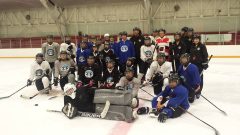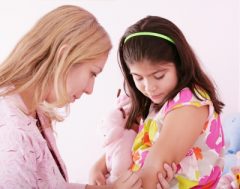Every year the Faculty of Science holds a Science Research Day to highlight the interesting and important research being conducted by Science Honours Thesis students. This year, the posters presented by Sierra Norville (Integrated Studies) and Nathalie Moreau (Neuroscience) were fabulously received. Sierra was interviewed for the University’s News Release (read here). And Nathalie’s poster won 3rd prize in the Neuroscience poster competition. Congratulations to both!
Here are their research abstracts:

Students with Canada’s Governor General, David Johnston
Nathalie Moreau, The Role of Participation in a Hockey Skills Academy on Achievement Outcomes of First Nations Children.
Systemic and historical discrimination have resulted in transgenerational effects on the well-being of Indigenous youth. This has resulted in disparities between Indigenous and non-Indigenous children in numerous domains, including academic success. The Hockey Skills Academy was launched in October 2015 at Sioux Mountain Public School with the objective to improve children’s academic achievement, school attendance and physical activity among participating students, 87% of whom are of First Nations ancestry. The present study evaluated the overall success of the Hockey Skills Academy and whether there was early evidence that the intended outcomes were achieved. Preliminary data were collected by Sioux Mountain Public School for students in grades 1-8. The data included mid-year achievement outcomes (Math Grades, Verbal Grades, Learning Skills) and daily attendance (Absences, Lates). Analyses of variance indicated that students registered in the hockey program (n=95; 38 girls, 57 boys) had significantly higher math and verbal report card grades than students not registered in the hockey program (n=166). No differences in learning skills were found between the two groups. Students who were registered in the hockey program were also less absent from school compared to students who were not registered. These data suggest that even at this early stage of the implementation, the Hockey Skills Academy may be having positive effects on children’s school performance.
 Sierra Norville, The Role of Personality and Social Connectedness on Vaccination Intent and Behaviour.
Sierra Norville, The Role of Personality and Social Connectedness on Vaccination Intent and Behaviour.
This study explored the role of socially oriented personality characteristics (altruism and Machiavellianism) and social connections and identification with different types of groups in vaccination decisions. Participants (N=244; 94 males, 148 females, 2 other) of a diverse age range (from 17 to 52 years) were recruited from Carleton University Psychology classes through SONA and invited to complete a questionnaire assessing Altruism, Machiavellianism, social connectedness, groups they affiliated with, and the importance of these groups. Regression analyses indicated that individuals possessing more altruistic traits were more likely to be vaccinated against influenza than individuals who had low altruism scores, and altruism was more strongly associated with vaccination intentions with increasing social connectivity. In contrast, possessing more Machiavellian traits and beliefs did not influence nor moderate the effects of social variables on vaccination behavior or intent. Finally, if friends and family were vaccinated and the individual believed others would be disappointed in them if s/he was not vaccinated, rates of vaccination were higher. Results indicate that personality alone is not necessarily a determinant of an individuals’ vaccination decision. Further research could look at different motivating factors based on different socially oriented personalities. Determining how to target different personalities would allow future vaccination campaigns to reach more people.